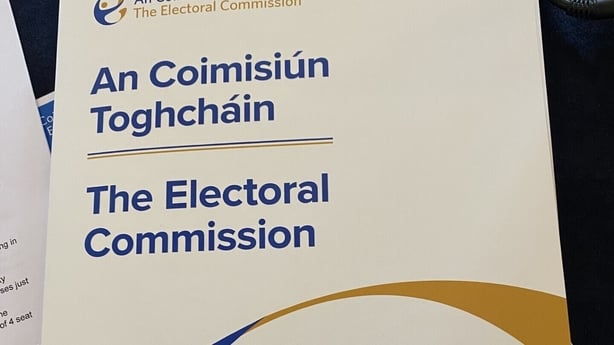Electoral Commission chair answers referendum questions

Chairperson of the Electoral Commission Justice Marie Baker has answered questions on RTÉ’s Morning Ireland on the upcoming referendums on 8 March on care and the family.
In relation to the concept of family, she summarised the proposed change.
“It’s important to say that the family as a unit is given special recognition as a fundamental unit group of society and is undoubtedly the case now that that family unit is the family unit based on marriage,” Justice Baker said.
“That’s been decided over many years of Irish jurisprudence, but as recently as four or five weeks ago.
“So, what’s proposed is not that we lose the recognition of the family unit as an important element of society, but that the family unit be recognised as being founded on marriage or on other durable relationship and that’s the expression.”
On the deletion of Article 41.2, referring to a woman’s life in the home, she said: “We’re being asked here to remove the reference to the importance of women’s work in the home and replace it with recognition of care given by family members to one another on account of their familial love for one another.
“So, that is recognition of care, but not just of care or work provided by women.”

‘Constitutions express values and broad principles’
She explained that constitutions express values and broad principles.
“And there will be no direct effect from this change in the same way as there’s no direct effect now from the recognition of the place of women’s work in the home in our understanding of society and our understanding of the common good,” Justice Baker said.
“The [Electoral] Commission has taken the view that there’s some difference between ‘strive’ and ‘endeavour’, at the moment the Constitution declares that the State would endeavour to ensure that women don’t have to go out to work, to the neglect of their duties in the home, that’s the word.
“It’s proposed that the State would have to ‘strive’ to support care by families, and the Commission has taken the view that strive is a somewhat stronger word than endeavor. It is actually found in Article 45 of the Constitution and it means try hard.
“Obviously it means try or try very hard. But what it probably could mean in litigation is that the State might have to justify where it not to make proper provision for care and financial or other support or recognition for care.”
She said that there is no legal definition of the word “strive”.
There is no judgment of the court or a definition legislation, she said.
“But courts would look at the general use in language, and it is a strong word,” Justice Baker said.
“It doesn’t mean try a little bit. It means try hard.”
She said that she does not see the current Article 41.2 as giving a person a right to stay at home.
“They have that right anyway. It’s a choice. What article 41.2 does is it recognises the place, it recognises the work done by women at home,” Justice Baker said.
“In other words, it’s a declaration of its value and that declaration of value won’t change. But it will be afforded to everybody, every carer within the family, provided to other family members.”
We need your consent to load this rte-player contentWe use rte-player to manage extra content that can set cookies on your device and collect data about your activity. Please review their details and accept them to load the content.Manage Preferences
Justice Baker said that the Electoral Commission did not draft the language of the referendums.
She said that the Constitution contains other references to women in Article 45, “but in general you’ll find a lot of the Constitution, particularly in the Irish text, which is the main text, will refer to ‘daoine’ – a person, in other words – rather than man or woman”.
Read more: ‘Durable relationship’ means permanent, stable – Butler
Watch: Referendums on family and care explained
Explained: What will people vote on in twin referendums?
Rights of women and children’s allowance
Will the care amendment diminish the rights of women or affect children’s allowance payments?
Justice Baker said that the children’s allowance is payable to the person who cares mostly for a child and you have to be a qualified person and the child has to be under 16 or 18, as the case may be.
“It’s payable to the mother if the parents live together,” she said.
“If the child is cared primarily by the father, it’s payable to the father. It’s payable to a guardian if the child or children are cared for by a guardian.
“The only time that there can be any difficulty about it is if a child is equally cared for by both parents, when the parents don’t live together.
“And in that case the default position is that it’s paid to the mother, but there’s nothing absolute here.
“This is all set out in regulations rather than in statutes. So, that can change. It can change now, even without this referendum, it could change if the referendum was passed.
“I don’t think I could give you an opinion that would go any further than that just to say that that’s the explanation.”
Constitutions ‘express your rights’
“To go back to what constitutions do, they express your rights,” Justice Baker said.
“You have a right to stay at home to mind your child. Whether you’re a man or a woman, the State in its current form in the Constitution recognises the importance that care in the home by mothers in one part of the article and by women and the other part of the article.
“The value that that provides to the common good. If they’re the articles are deleted and there’s a change, the difference would be a recognition of the cares provided by family members, men or women for one another or for their family members within the home.
“So I don’t see a change in women’s rights because they will be regarded as persons providing care as it were.”
Will friends be covered by the referendums?
On whether friends will be covered by the referendums, Justice Baker said she does not believe they will, as friends are not usually considered as family.
“The durable relationship as a foundation of family can’t be taken on its own,” she said.
“You’re not asking am I close friends with this person for all my life, you’re asking whether my relationship with that person makes us a family unit. And I think it’s unusual for friends living together to regard themselves as a family unit.
“They might say these are my personal relationships. This is my private life, but I think it’s probably not your family life.”
In relation to the carer’s referendum, she said she does “not think the referendum is intended to provide any support for persons caring for others who are not within the family, as it were.
“No, the family in the second proposed referendum won’t change. It doesn’t have a capital ‘f’, so I think the family is not intended to be the constitutional unit, that now has recognition in 41.1.
“So, I think the proposal in 41.2 to change 41.2 and put in the carers provision is intended to perhaps reflect a slightly more fluid family, but I think probably friends are not family.”
Citizenship rights
On any possible change to citizenship rights, Justice Baker said that immigration is regulated by law and European instruments as well.
“So, a lot of our immigration law arises from our European obligations, immigration and the power of the State to regulate how people can live here, whether they can come and live here, whether they get visas, etc, is quintessentially a matter for the Executive,” she said.
“And the courts have always deferred to the Executive decision. It is the mark of sovereignty that a country can protect its boundary.
“Because immigration and boundaries and everything to do with citizenship is so quintessentially a matter for the Executive, for government, I don’t see the courts looking to this as a different source for citizenship or immigration law and for the last whatever number of years since 1937, and particularly in the last 20 or 30 years, the courts have undoubtedly rejected an argument that the Constitution should be the source of a separate way of coming to live here or getting citizenship.
“They have not given automatic rights to married people to bring their spouse, so I don’t see that connection, and I don’t see that that that this could in any sense change the approach that the court takes to immigration law.”





